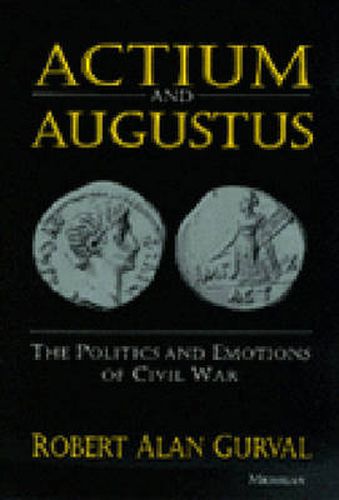Readings Newsletter
Become a Readings Member to make your shopping experience even easier.
Sign in or sign up for free!
You’re not far away from qualifying for FREE standard shipping within Australia
You’ve qualified for FREE standard shipping within Australia
The cart is loading…






On 2 September 31 B.C.E., the heir of Julius Caesar defeated the forces of Antony and Cleopatra in a naval engagement at Actium. Despite the varied judgments this battle received in antiquity, common opinion held that Actium marked the start of a new era, a turning point in Roman history and, indeed, in Western civilization.
Actium and Augustus marks a turning point as well. Robert Alan Gurval’s unusual approach is to examine contemporary views of the battle and its immediate political and social consequences. He starts with a consideration of the official celebration and public commemoration of the Actian victory and then moves on to other questions. What were the Actian monuments that Octavian erected on the battle site and later in Rome? What role did the Actian victory play in the political formation of the Principate and its public ideology? What was the response of contemporary poetry? Throughout, this volume concentrates on contemporary views of Actium and its results.
Written to include the general reader, Actium and Augustus presents a thoughtful examination of a complex period. All Greek and Latin quotations are translated, and extensive illustrations present graphic evidence about the issues Romans faced.
$9.00 standard shipping within Australia
FREE standard shipping within Australia for orders over $100.00
Express & International shipping calculated at checkout
Stock availability can be subject to change without notice. We recommend calling the shop or contacting our online team to check availability of low stock items. Please see our Shopping Online page for more details.
On 2 September 31 B.C.E., the heir of Julius Caesar defeated the forces of Antony and Cleopatra in a naval engagement at Actium. Despite the varied judgments this battle received in antiquity, common opinion held that Actium marked the start of a new era, a turning point in Roman history and, indeed, in Western civilization.
Actium and Augustus marks a turning point as well. Robert Alan Gurval’s unusual approach is to examine contemporary views of the battle and its immediate political and social consequences. He starts with a consideration of the official celebration and public commemoration of the Actian victory and then moves on to other questions. What were the Actian monuments that Octavian erected on the battle site and later in Rome? What role did the Actian victory play in the political formation of the Principate and its public ideology? What was the response of contemporary poetry? Throughout, this volume concentrates on contemporary views of Actium and its results.
Written to include the general reader, Actium and Augustus presents a thoughtful examination of a complex period. All Greek and Latin quotations are translated, and extensive illustrations present graphic evidence about the issues Romans faced.